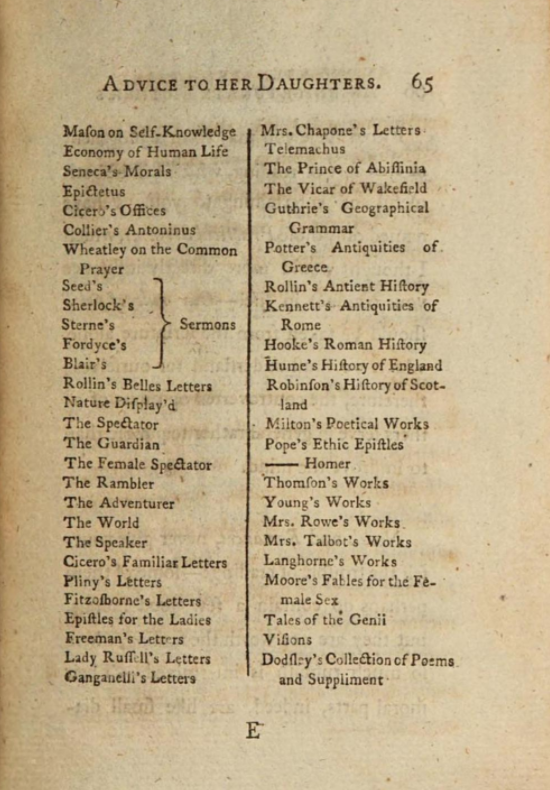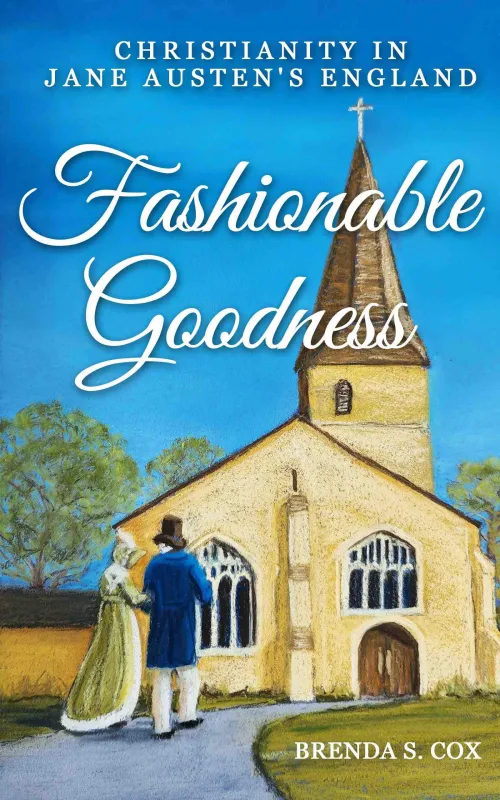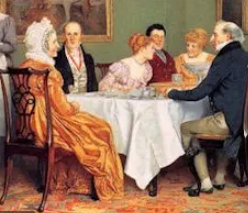During Jane Austen’s lifetime, conduct literature that advocated ideal conduct and character for young women was common. In the form of letters, pamphlets, and full-length novels, conduct literature covered an array of topics meant to instruct and inform.
Conduct manuals played a large part in forming Austen’s culture and the world of her novels. To better understand her world and her characters, let’s take a closer look at the world of conduct literature for young ladies.
Conduct Books
Whereas etiquette books of the last century, such as Emily Post’s Etiquette, stressed good manners and how to behave in specific social situations, the conduct manuals and letters written for young ladies in Jane Austen’s time focused mainly on propriety. The central purpose was to mold the character of a young woman and teach her how to think, act, and speak in a way that was both morally and socially proper.
Conduct manuals discussed a wide range of subjects, including household chores, religion, and what to look for in a husband. However, the underlying concern evident in most of the conduct pamphlets being written at this time was the cultivation of “virtue” in the female sex. As Mary Wollstonecraft Godwin states in Thoughts on the Education of Daughters (1787), “the main business of our lives is to learn to be virtuous.” And according to many eighteenth-century conduct books, a woman’s virtue was expressed in her attitudes, her carriage, her accomplishments, and her actions and speech.
But what did these books, letters, and pamphlets actually say? Let’s take a closer look at three examples from the late 1700s to see what young ladies were taught during Austen’s youth and adolescence:
“A Father’s Legacy to His Daughters”
In John Gregory’s popular conduct book, A Father’s Legacy to his Daughters (first published in 1774), Gregory told his daughters that they should aspire to the kind of “virtue” their deceased mother possessed and put on “a certain gentleness of spirit and manners extremely engaging in [women].”

Carl H. Pforzheimer Collection of Shelley and His Circle, The New York Public Library. “A father’s legacy to his daughters.” The New York Public Library Digital Collections.
The topics for this particular conduct book are as follows:
- Religion
- Conduct and Behaviour
- Amusements
- Friendship, Love, Marriage
On the topic of Amusements, Gregory has this to say:
Some amusements are conducive to health, as various kinds of exercise: some are connected with qualities really useful, as different kinds of women’s work, and all the domestic concerns of a family: some are elegant accomplishments, as dress, dancing, music, and drawing. Such books as improve your understandings, enlarge your knowledge, and cultivate your taste, may be considered in a higher point of view than mere amusements. There are a variety of others, which are neither useful nor ornamental, such as play of different kinds.
John Gregory, A Father’s Legacy to his Daughters
On the topic of Friendship, Gregory makes these comments:
A happy choice of friends will be of the utmost consequence to you, as they may assist you by their advice and good offices. But the immediate gratification which friendship affords to a warm, open, and ingenuous heart, is of itself sufficient motive to court it. In the choice of your friends, have your principal regard to goodness of heart and fidelity. If they also possess taste and genius, that will still make them more agreeable and useful companions.
John Gregory, A Father’s Legacy to his Daughters
“An Unfortunate Mother’s Advice to Her Absent Daughters”
In Lady Pennington’s An Unfortunate Mother’s Advice to Her Absent Daughters (1761), she covers many topics for young ladies, complete with an index of books her daughters should read as part of her discussion on how her daughters should make “mental improvements” through reading, which gives us insight into other literature of the time period that was considered edifying for young ladies:
Along with Gregory, Pennington suggests that virtue should be a person’s highest goal: “Aim at perfection, or you will never reach to an attainable height of virtue.”
She goes into great detail on an expansive number of subjects, but one interesting highlight that seems to have been common for Jane Austen herself and for her leading ladies is in regard to one’s daily schedule. She explains that mornings should be spent in domestic duties and “improvement.” Afternoons “may then be allowed to diversions” (which includes “company, books of the amusing kind, and entertaining productions of the needle, as well as plays, balls”).
But, she says, the former part of the day should be “devoted to more useful employments”:
One half hour, or more, either before or immediately after breakfast, I would have you constantly give to the attentive perusal of some rationally pious author, or to some part of the New Testament, with which, and indeed with the whole Scripture, you ought to make yourself perfectly acquainted, as the basis on which your religion is founded. From this practice you will reap more real benefit than can be supposed by those who have never made the experiment.”
Lady Pennington, An Unfortunate Mother’s Advice to Her Absent Daughters

Further advice includes studying “your own language thoroughly, that you may speak correctly, and write grammatically.” She suggests being “well acquainted” with French and, if possible, Italian; the history of England other European nations; Geography, as this will “make history more entertaining to you;” Philosophy; and the “first four rules of Arithmetic.” Music and Drawing are humorously described as “accomplishments well worth the trouble of attaining, if your inclination and genius lead to either: if not, do not attempt them; for it will be only much time and labour unprofitably thrown away.”
Finally, a quote I found personally inspiring which I can imagine Austen might have agreed with:
Expect not many friends, but think yourself happy, if, through life, you meet with one or two who deserve that name, and have all the requisites for the valuable relation.
Lady Pennington, An Unfortunate Mother’s Advice to Her Absent Daughters
“An Enquiry into the Duties of the Female Sex“
Austen herself read a conduct manual titled An Enquiry into the Duties of the Female Sex, written by Thomas Gisborne (1797), which followed his popular “Enquiries into the Duties of Men.” It covers topics such as the differences between men and women, female education, introducing young women into society, conversation and letter writing, dress, entertainment, the employment of time, choosing a husband, the duties of parents, and so forth.
I am glad you recommended “Gisborne”, for having begun, I am pleased with it, and I had quite determined not to read it.
Letter from Jane to Cassandra, 30 August 1805
To explain Austen’s possible reason for this common, the British Library has this to say:
“We don’t know why Austen had ‘determined not to read’ An Enquiry. Perhaps she expected it to be similar to the Mr Collins-endorsed Sermons to Young Women, referred to in Pride and Prejudice, which stresses the need for women to be submissive and modest. In fact, Gisborne praises woman’s capacity for ‘sprightliness and vivacity’, ‘quickness of perception’ and ‘fertility of invention’ – as well as the more traditional female virtues of offering comfort and cheer to those around them.
“Though Gisborne’s views seem conservative to modern readers, many of them are similar to those that Austen expresses in her novels. He urges women to spend time each day reading improving books, mentioning as particularly suitable the works of William Cowper, one of Austen’s favourite poets (p. 219). He warns against the ‘absurd and mischievous’ belief that a woman can reform a cruel and immoral man after marrying him (p. 238), and criticises mothers who prioritise wealth over happiness in choosing husbands for their daughters.” (British Library, Conduct Book for Women)
Forms of Conduct Literature
There were countless other conduct books, letters, and pamphlets written during Austen’s lifetime. These, along with sermons and religious writings, were the only kind of reading material that was thought proper for young ladies. Later, didactic novels that taught a moral lesson in story form, became more popular. Still within the genre of conduct literature, didactic novels were written to entertain and instruct. Stay tuned for more on that topic next month.
I encourage you to follow the links above and read some of these books for yourself. It’s quite interesting to find out what exactly young women were taught during Jane Austen’s time. And it’s easy to see where Austen may have found instruction, inspiration, and even, at times, amusement within their pages.
RACHEL DODGE teaches college English classes, gives talks at libraries, teas, and book clubs, and writes for Jane Austen’s World blog and Jane Austen’s Regency World magazine. She is the bestselling author of The Anne of Green Gables Devotional: A Chapter-By-Chapter Companion for Kindred Spirits and Praying with Jane: 31 Days Through the Prayers of Jane Austen. Her newest book The Little Women Devotional is now available. You can visit Rachel online at www.RachelDodge.com.











Thank you, Rachel. I find these conduct books fascinating.
My pleasure! I do, too!
Thank you for sharing these.
denise
Thank you, Denise! I did my Master’s thesis on conduct literature long ago, and I’ve been intrigued ever since.
What a cool subject for your Master’s thesis.
d
Modern readers should take note that the precepts of what makes a proper young lady are still valid. Princess Diana was famous for writing thank you notes. Of course, William Cowper’s ‘absurd and mischievous’ belief applied to her, too.
Thanks, Rachel. This is an area I’ve been wanting to explore more. I’ve read a fair bit of Gisborne and found it quite interesting. I wonder if Fordyce’s Sermons could be considered a conduct book? I can’t imagine that he actually preached those sermons to congregations, since they are specifically addressed to young ladies. And it seems to be similar material. I think that, like Gisborne, Austen would have agreed with a fair bit of what Fordyce says. She does have Mr. Collins read it, but it’s Lydia who doesn’t like it, and I don’t think we can assume Austen’s opinion aligns with Lydia’s!
Thanks for this. I also enjoy reading period conduct and etiquette books. We do some living history and they help us to try to come across more like the period we’re representing. They also give us more insight into understanding the times and expectations. Not only is it interesting, but it also helps when we’re reading literature of the era. After reading some regency ones i could understand more the social errors Jane Austen has some of her characters, like Mr. Collins, commit.